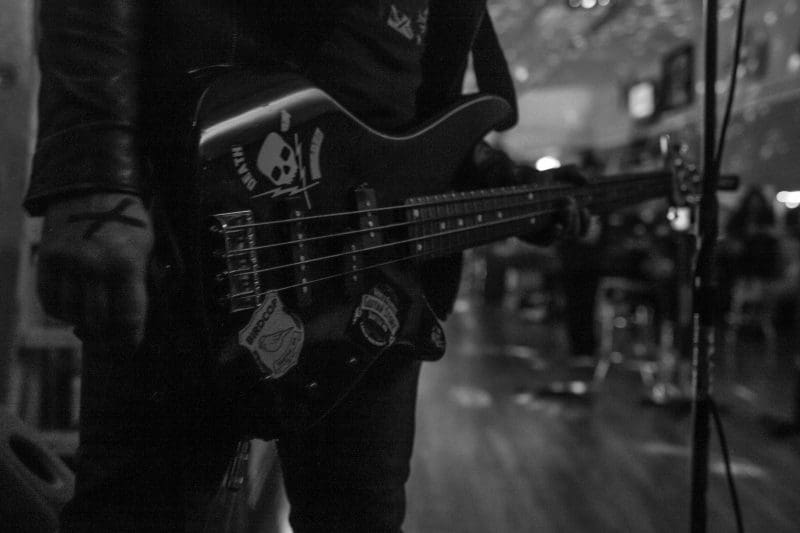
Raw, edgy, and unapologetically rebellious, crust punk is a genre that, despite its underground status, has left a profound impact on the music industry. Crust punk, or simply crust, as its ardent fans often refer to it, is not just a genre of music. It’s a subculture, a movement, a lifestyle. Its influence extends beyond the confines of the music world, shaping fashion, politics, and societal norms in the process. It’s a genre that’s both revered and misunderstood, loved by many, yet shrouded in mystery.
In this article, we’ll take you through an in-depth exploration of crust punk, dissecting its unique characteristics, tracing its history, and looking at its future. If you’re a crust punk enthusiast looking to deepen your understanding of the genre or a curious music lover eager for a taste of something different, this article is for you.
What Is Crust Punk?
Crust punk is a genre of music that emerged in the early 1980s, primarily in the United Kingdom. It’s a fusion of elements from punk rock, heavy metal, and anarcho-punk, resulting in a raw, gritty, and heavy sound. The lyrics of crust punk songs often touch on socio-political issues, reflecting the genre’s roots in anarchism and its rebellious ethos.
The term “crust punk” is believed to have originated from the UK band Hellbastard and their 1986 demo tape “Ripper Crust”. The genre, however, predates this. Bands like Amebix and Antisect are regarded as pioneers of the crust punk sound, even though they didn’t label themselves as such.
One thing that sets crust punk apart from other genres is its DIY ethos. Crust artists often self-release their music, organise their own shows, and create their own merchandise. This DIY approach is a testament to the genre’s spirit of self-reliance and resistance to commercialisation.
Characteristics of Crust Punk Music
Crust music is characterised by its raw, aggressive sound. The guitars are typically heavily distorted, the bass lines are thick and heavy, and the drums are played at breakneck speeds. The vocals are often harsh and guttural, further accentuating the genre’s edgy, confrontational nature.
Lyrically, crust songs often tackle issues such as class struggle, environmentalism, anti-war sentiments, and anarchism. These lyrics serve as a form of protest for crust punk artists to voice their discontent with societal norms and injustices.
Despite its aggressive sound and confrontational lyrics, the genre isn’t devoid of melody. Many crust songs incorporate melodic elements, contrasting the genre’s raw aggression.
History of Crust Punk
The history of crust punk is closely tied to the punk and anarcho-punk movements of the late 1970s and early 1980s. Bands like Crass and Discharge, known for their anarchistic beliefs and DIY approach, laid the groundwork for what would become crust punk.
In the mid to late 1980s, bands like Amebix, Antisect, and Hellbastard began to incorporate elements of heavy metal into their punk sound, resulting in a new, heavier form of punk that would later be dubbed “crust punk”. The genre quickly spread across the UK and eventually made its way to the United States, where bands like Nausea and Aus-Rotten further developed the crust sound.
Despite its underground status, crust has profoundly impacted the music industry, influencing many other genres and artists. Bands like Napalm Death and Neurosis, for example, have cited the genre as a significant influence on their music.
Influences and Inspirations of Crust Punk
Crust punk draws its influences from a wide variety of genres. With its raw energy and rebellious spirit, punk rock is a major influence on crust. The genre also takes inspiration from heavy metal, particularly the slow tempos and heavy riffs of the doom and sludge sub-genres.
Anarcho-punk, a genre that emerged in the late 1970s and early 1980s, is another significant influence. Anarcho-punk bands like Crass and Conflict are known for their politically-charged lyrics and DIY ethos, elements that have been heavily incorporated into the genre.
In addition to these musical influences, crust is heavily influenced by political and societal issues. The genre’s lyrics often reflect a deep discontent with societal norms and injustices, serving as a form of protest against the status quo.
Fashion and Culture in the Crust Punk Scene

The crust punk scene is characterised by its distinct fashion and culture. Crust punks often dress in black, distressed clothing adorned with patches and band logos. This style reflects the genre’s DIY ethos and its rejection of consumer culture.
The crust punk culture is also deeply rooted in anarchism. Some crust punks choose to live in squats or communal houses, supporting themselves through odd jobs or busking, and organising their own shows and festivals. This lifestyle is a form of protest against societal norms and the commercialisation of music.
Despite its rebellious nature, the crust scene is known for its sense of community and solidarity. Crust punks often help each other out, whether it’s by sharing resources, supporting each other’s bands, or organising benefit shows for causes they believe in.
Crust Punk’s Impact on the Music Industry

Despite its underground status, crust punk has significantly impacted the music industry. Its raw, aggressive sound and socio-political lyrics have influenced many other genres, from grindcore to black metal.
More importantly, crust punk’s DIY ethos has inspired countless artists to take control of their music and careers. This ethos has sparked a wave of independent labels, DIY venues, and self-released music, challenging the traditional music industry model and empowering artists in the process.
Crust punk has also played a pivotal role in raising awareness about various socio-political issues. Its politically-charged lyrics and activist culture have shed light on topics such as class struggle, environmental degradation, and war, making it a powerful tool for social change.
Top Crust Punk Albums
There’s a wealth of incredible crust punk albums out there, each showcasing the genre’s unique blend of raw aggression and socio-political commentary. Here’s our list of ten essential crust albums that showcase the genre’s spirit and diversity.
Amebix – “Arise!”
The album “Arise!” by Amebix, a British crust punk band, is a seminal piece of work in the genre. Released in 1985, it was a groundbreaking blend of punk and metal music, featuring dark, dystopian themes and aggressive soundscapes. Incorporating the crust ethos, Amebix’s “Arise!” presented a bleak and uncompromising view of the world, resonating with fans of alternative music. Its raw power and unique sound continue to influence bands and musicians today.
In short, “Arise!” is not just an album; it’s a defining moment in the history of crust punk music.
Nausea – “Extinction”
Nausea’s “Extinction” is a profound exploration of the crust punk genre. Released in the early ’90s, it marked a significant moment in the evolution of punk music. The album is characterised by its aggressive sound, strong political messages, and raw production quality. It exemplifies the crust sub-genre through its dark, heavy sounds and confrontational lyrics.
Despite the passage of time, “Extinction” remains a seminal work that continues to inspire and influence emerging bands within the crust and larger punk scene.
Dystopia – “Dystopia”
“Dystopia” is an album that reflects the grim realities of the world through the lens of crust. Staying true to its name, the album paints a picture of an imagined state or society where there is great suffering or injustice. It’s a deep dive into the harsher aspects of life, blending together layers of heavy crust punk music with thought-provoking lyrics.
The album is a perfect representation of the band’s artistic ethos. It delivers a poignant message encapsulated in a harsh, yet enthralling musical composition.
Disfear – “Soul Scars”
The album “Soul Scars” by Disfear is an exceptional offering in the crust genre. With its aggressive riffs and raw energy, it embodies the hardcore ethos that defines the crust sound. The album showcases Disfear’s ability to craft intense, fast-paced tracks that resonate deeply with listeners. It’s a testament to their creative prowess and distinctive style, making “Soul Scars” a must-listen for avid followers of the genre and casual listeners alike.
The album’s powerful lyrics and unapologetic sound have consistently struck a chord with audiences, leaving an indelible mark on the crust punk scene.
Darkthrone – “Circle the Wagons”
“Circle the Wagons” is a seminal album from Norwegian black metallers Darkthrone. The release of 2006’s “The Cult is Alive” saw the band significantly shift their sound to include elements of crust, in what would be dubbed “blackened crust”. This era of the band culminated in 2010’s outstanding “Circle the Wagons”. The album, with its raw, gritty sound and aggressive rhythms, offered a fresh perspective on the fusion of black metal and crust punk.
The audacious experimentation in “Circle the Wagons” further solidified Darkthrone’s reputation as innovators within their field. It is a fascinating exploration of musical boundaries, and an essential listen for any fan of the genre.
Boris – “No”
The album “No” by Boris signifies a bold departure from the band’s signature style. This album stands out among their discography, serving as a sonic exploration that pushes the boundaries of genre definitions. The crust element in the tracks intensifies the raw, unfiltered energy that Boris is famous for, yet it also introduces a new level of intensity and depth to their music.
“No” pays testament to Boris’ enduring relevance in the music industry and their ability to constantly innovate and challenge expectations. It is an album that demands attention and respect, reaffirming Boris’ position as pioneers in their field.
His Hero Is Gone – “Monuments to Thieves”
“Monuments to Thieves” is a seminal album by the band His Hero Is Gone, who made a notable contribution to the crust genre. The album’s potent blend of heavy metal and hardcore punk epitomise the raw and relentless energy of crust music. The band’s lyrical content on socio-political issues also solidifies their place in the annals of crust punk.
“Monuments to Thieves” is a sonic testament to the spirit of rebellion and dissent. It perfectly embodies the essence of crust in its most primal form.
Fall of Efrafa – “Owlsa”
“Owlsa” by Fall of Efrafa is a remarkable work in the crust genre. With the album, the band, famous for their powerful lyrics and deep underlying messages, created an album that is a testament to their creativity and musical prowess. The raw energy and emotion in “Owlsa” make it a compelling album, appreciated by both critics and fans alike. The fusion of crust punk with elements of post-rock and atmospheric sludge metal creates an immersive listening experience.
From the instrumentation to the lyrical content, “Owsla” is an album that brings out the essence of Fall of Efrafa’s unique sound and storytelling ability.
Oathbreaker – “Eros/Anteros”
Oathbreaker’s “Eros/Anteros” is a profound exploration of the boundaries of the crust punk genre. The Belgian band’s second full-length release showcases their knack for blending aggressive guitar riffs, raw vocals, and atmospheric soundscapes. The album’s lyrical content dives deep into themes of love and loss. Furthermore, the raw intensity of the vocals perfectly mirror the heavy musical arrangements. This fusion of crust punk with black metal and post-hardcore elements makes “Eros/Anteros” a standout offering in Oathbreaker’s discography. The album demonstrates the band’s capacity to push genre boundaries, while staying true to their crust roots.
Ictus – “Imperivm”
The album “Imperivm” by Ictus is a significant contribution to the crust genre. The album showcases the band’s unique ability to blend aggressive guitar riffs, thunderous drumming, and powerful vocals, resulting in a compelling musical experience. “Imperivm” stands as a testament to Ictus’ musical prowess and their mastery of the genre, offering a raw and intense sound that resonates with listeners.
The album’s dynamic composition, coupled with its thematic depth, offers an immersive listening experience. It’s an epitome of the band’s creative vision and their dedication to pushing the boundaries of their genre.
The Future of Crust Punk
The future of crust punk is as unpredictable as the genre itself. Despite its underground status, the genre continues to thrive, with new bands emerging and older bands still active.
In recent years, there’s been a resurgence of interest in crust punk. Bands like Wolfbrigade, Tragedy, and From Ashes Rise have garnered attention from crust enthusiasts and mainstream music listeners alike. This resurgence is a testament to the genre’s enduring appeal and its relevance in today’s socio-political climate.
As long as there are injustices to protest against, societal norms to challenge, and a status quo to disrupt, crust punk will continue to exist. Its raw, aggressive sound, socio-political lyrics, and DIY ethos make it a genre that’s not only captivating to listen to but also deeply relevant and vital.









